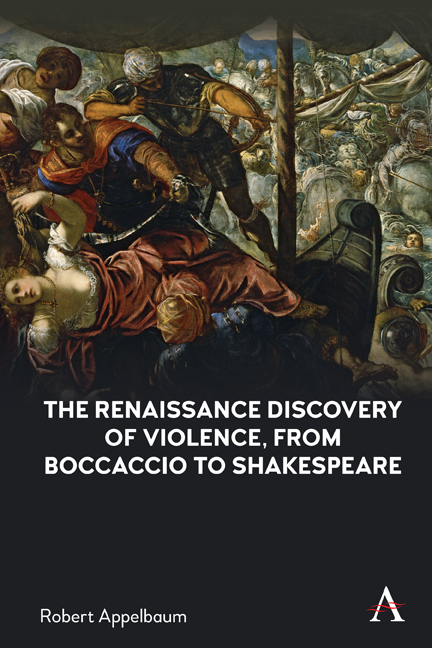Book contents
- Frontmatter
- Dedication
- Contents
- A Note on the Texts
- Acknowledgments
- Preface
- Chapter One Overture: The Show of Violence
- Chapter Two The Moral Economy of Violence in the Renaissance Novella Collection: Straparola, Bandello and Marguerite de Navarre
- Chapter Three Pacifism, Erasmus and More
- Chapter Four Violence as Labor: The Heroic Narrative
- Chapter Five “Tragedy Shows Us What We Must Flee From”
- Afterword
- Select Bibliography
- Index
- Frontmatter
- Dedication
- Contents
- A Note on the Texts
- Acknowledgments
- Preface
- Chapter One Overture: The Show of Violence
- Chapter Two The Moral Economy of Violence in the Renaissance Novella Collection: Straparola, Bandello and Marguerite de Navarre
- Chapter Three Pacifism, Erasmus and More
- Chapter Four Violence as Labor: The Heroic Narrative
- Chapter Five “Tragedy Shows Us What We Must Flee From”
- Afterword
- Select Bibliography
- Index
Summary
This book addresses the representation of violence in Renaissance literature. It tries to account for the impulse to put violence into words or, in the case of drama, to put violence into words spoken on stage, coupled with gesture, movement and spectacle. And it tries to measure that impulse against the actual conditions of violence in the period. There were many sides to this impulse. Violence was often represented in literature as an expression of rage or desperation, but it was also frequently represented as the means toward a reasonably desired end, or an end that could be rationalized before or after the fact, however brutal or cruel. Violence could be undertaken by noblemen or commoners, by magistrates and thieves, by legitimate agents of the state or by rebels against the state. It could be individual or collective. It could be defensive or offensive. It could follow established codes of conduct (as in a duel) or provocatively defy all rules (as in an insurrection or a massacre of civilians). It could be tidy or horrendous. But it was always—or at least so this study will conceptualize the phenomenon—an action that was performed. Representations of violence in the Renaissance were in effect performances of performances or, in other words, re-presentations of presentations.
Exploring these performances of performances, this study focuses on four genres or modes of writing—the novella, the Menippean prose satire, the epic romance and tragic drama—and it emphasizes how these writings both contextualize the performance of violence and undergo contextualization by the pressure of events beyond their control. Along the way the study examines how storytelling (about violence and other matters) emerges from oral tradition to become a self-consciously literary pursuit, as well as how it discovers the historical dimensions of everyday life, treating such topics as vengeance, war and sexual assault as encounters not only between rivals or enemies but also between the individual and society, or between private aspirations and public actualities. When discussing satirical prose this study examines just war theory and pacifism, referring their progress, on the one hand, to ancient theoretical and ecclesiastical traditions and, on the other, to new developments in the technology, the ideology and the undertaking of war. What does it mean to go to war? these writings ask disapprovingly.
- Type
- Chapter
- Information
- The Renaissance Discovery of Violence, from Boccaccio to Shakespeare , pp. xiii - xxxPublisher: Anthem PressPrint publication year: 2021



